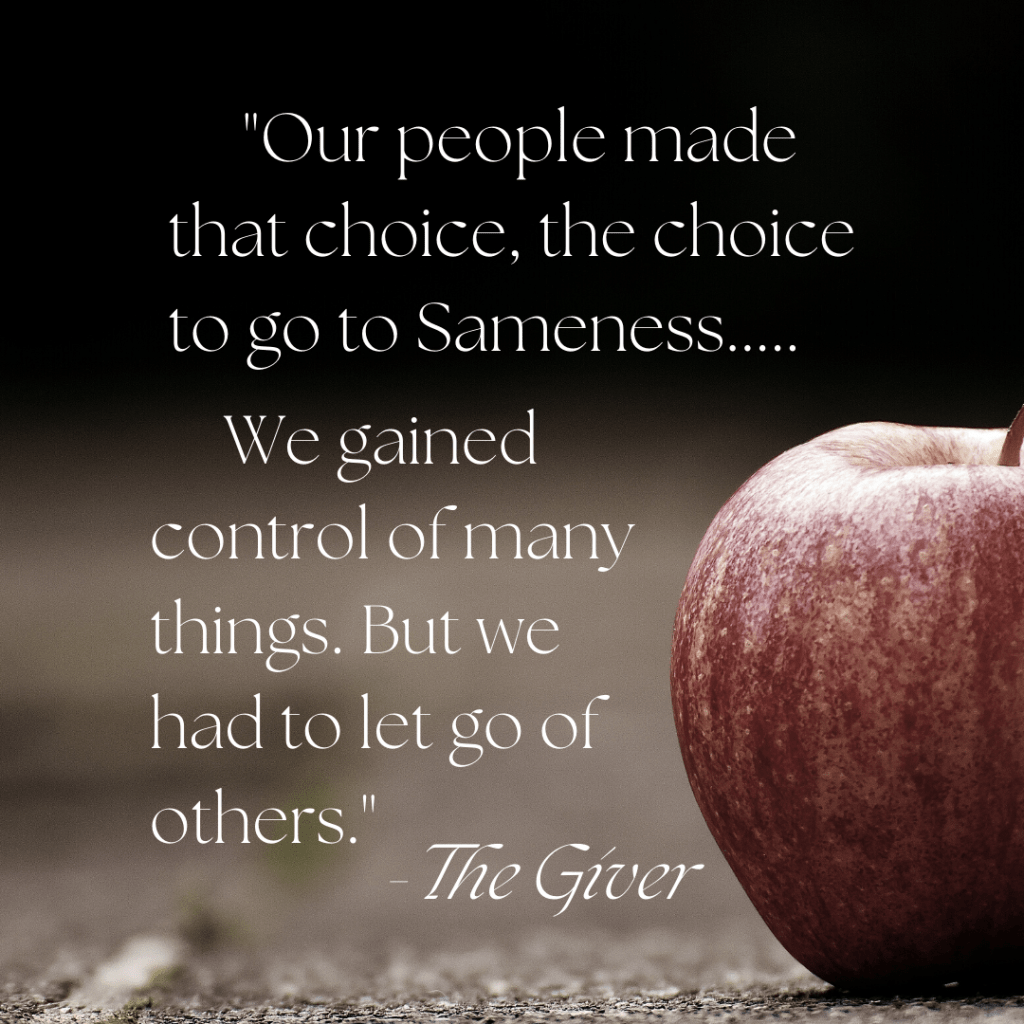By Sophia Monastra
What if no one had to make choices?
I’m not asking if no one was allowed to make choices. What if choice wasn’t something to dread or a burden to worry about because no one had to make choices? As someone who struggles with choosing things like where to eat lunch or my entire college major, this would be great. For me, choice is stressful because it involves opportunity cost. Choosing something means giving up on something else. And wrong choices? Those have lasting consequences.
But would the safety of never making wrong choices again justify removing the freedom of choice and everything that comes with it?
The isolated world of The Giver is sterilized, safe, and the same. The land is flat, the weather controlled. Careers are assigned, manners are emphasized, and crime and poverty are unheard of. Everything from spouses to family unit assignments to distribution of bicycles and mandatory sharing of emotions and dreams is regulated. This “Sameness” brings peace, equality, and stability.
At age twelve, children of the community are assigned to the careers they will hold for the rest of their life. For instance, Jonas’s father was assigned as a Nurturer, which means he takes care of Newchildren. His mother was assigned to the Department of Justice. Unlike them, Jonas doesn’t have any idea where he might end up.
His whole life, Jonas has caught glimpses of something he doesn’t understand, a gift known as “seeing beyond”. In the Ceremony of Twelves, Jonas is assigned to be the new Receiver, the person who bears the collective memories of the past. The previous Receiver, now referred to as the Giver, transfers memories of color, weather, pain, warmth, grief, war, and love to Jonas. As Jonas learns more about the world before, he begins to wonder if the way his community has always run is really right.
The first and second acts of the novel are similarly sized, setting up a clear comparison and contrast between what Jonas knows and what Jonas learns from the Giver and through the memories. The third act is much shorter, with only four of the twenty-three chapters. The novel ends abruptly, with very little resolution. The novel spans an odd gap between dystopian and fantasy, with references to pilots and pills and injections, but also strange powers and telepathy-like passing of emotions that can’t quite be explained by science. There’s little action, but important revelation is often communicated through dialogue, making this book prime material for a play rather than a movie. The prose is simple, told in a middle-school style of language, a stylistic choice I found communicates the theme clearly and with quiet grief.

The community in The Giver chose to no longer make choices. People made wrong choices, and because of that, the community gave up making their own choices, favoring peace and predictability over vibrancy. They bred themselves to stop seeing color, created climate control and got rid of the sun in order to maximize production, cut down hills to make it easier to travel, and set up matching processes for spouses and children.
The rationale is that it’s better this way, and it’s easy to agree. But the community is hollow. They provide special care for the elders, but as an institution. They place two children with each family unit but do away with familial bonds. They have specific nurturers for children, but these caretakers aren’t parents. The world in The Giver has structured the family so rigidly that they lost the beauty.
The position of Receiver exists because long ago, it was decided that one person should bear all the pain and weight of memory so the collective didn’t have to. In this way, they can preserve wisdom from the past but not bear the burden it carries. It makes it easier for the community because they don’t have to feel the pain that memories such as war and grief bring. With no memories attached to these universal feelings, emotional responses are easily communicated and processed over the dinner table. They can enjoy their safe, comfortable placidity. But this emotional stunting has devastating effects. I’d like to avoid spoilers as much as possible, but without the ability to feel pain, anger, and sadness, none of the people can feel joy or love or warmth. Without memory, even morality is framed by how the community has always been run, which leads to chilling consequences.
Grief makes joy brighter. Loss makes love sweeter. Loneliness makes warmth more beautiful. There has to be a risk in order to feel reward, The Giver says.
The Giver was published in 1993, and several copies are available in the Centennial Library. The play adaptation by Eric Coble will run from September 29 to October 1 and October 6 to 9 at Cedarville’s DeVries Theatre. Tickets are on sale now.
Sophia Monastra is a freshman Environmental Science major and writer for Cedars’ Arts and Entertainment section. She lives in mortal fear of longboards and enjoys reading comics, writing fiction, and experiencing deep emotions about teenage mutant turtles.
Photo credit to Roberto Moran. Display is courtesy of the Centennial Library.


No Replies to "“The Giver” is a Chilling Discussion on the Importance of Memory and Choice"